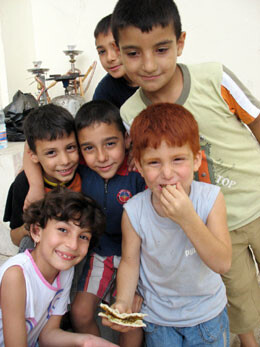IRIN 22 July 2006

Mehdi Jaber (with red hair), Hady Yassine (above him) and friends. (Marie Claire Feghali/IRIN)
IRIN spoke to a number of people driven from their homes by the fighting on the hardships they now faced.
Linda Khalil (31)
“Rockets destroyed our house in Mansoury village [near the southern border]. All we have left is the car, so my husband and our baby and me drove to Beirut. We spent 10 hours on the road before we found a school to stay in. We watched the raids and warplanes destroy everything behind us.
“Help is very slow, and we have almost nothing. Food comes irregularly, and no one has provided us with any medicine. All we have eaten so far, since we left three days ago, is plain bread and tuna in cans occasionally. And when we run out of money, we’ll end up on the street. We want the war to end. We want to go home.”
Hiam Younes (17)
“We left our house in Damour (20 km south of Beirut) in a pick-up truck in the early morning. I will never forget that. We were 25 people inside it, and as soon as we crossed the bridge Israeli planes destroyed it. We saw the smoke behind us. I don’t know anything about the house. When we left, all the glass was shattered.
“It took nine hours to arrive in Beirut. We brought no clothes, no food, nothing. We cannot move because we are not familiar with the streets. The men left us here to go bury the dead left behind in Nabatyeh [capital of the southern governate of the same name]. Here we have nothing. All 25 of us share three sponge mattresses and some sardines and tuna cans with bread. We lost contact with the rest of our families and neighbours, and there’s no one in the village to tell us if our house is still standing.”
Rajeh Hassan (23)
“We have been displaced for five days now. When the bomb hit the bridge above our house, we knew it was time to leave. Baba drove the mini van at midnight and brought us to this school. We only brought pyjamas. All the glass is shattered in the neighbourhood buildings. In this school, sanitation is poor. The children have allergies from eating canned tuna in the heat and they have no milk.
“We only want the war to stop, so we can go back home. Inshallah [God willing], it will be over soon, though I feel it’s a long, long war. No one here cares about people - we have no value in their eyes. Look at what the Israelis did for the sake of two people (soldiers), only two. Humans are cheap in Lebanon, and if I had the chance to leave, I would have fled this country a long time ago.”
Hady Ali Yassine (8)
“Dad put me and my sister Ithraa in the car last night, and told us we had to get away from the bombs near the airport. He didn’t wake me up, because I wasn’t sleeping anyway. Ithraa was scared and shouting, and mum was crying. I didn’t change so was wearing pyjamas, and didn’t have time to wear my shoes. That’s why I can’t run here with the other kids.
“We went to several schools before coming to this one in Beirut. I don’t like Beirut. Ithraa is sick, she has a fever. I think she doesn’t like living in this school. All we eat is bread and tuna fish in cans, and the water is dirty. When the war is over, I will buy mosquito repellent.”
Mehdi Jaber (6)
“My name is Mehdi, and I’m six years old. We left our home near the airport when the Israelis started bombing us. Bayyeh (dad) took us to school here in Beirut, and left our fan and air-conditioning back home. I don’t like the school here; it’s summer and we’re not supposed to sleep in the classroom.
Here, mosquitoes bite us all night and the toilets smell. It’s very hot, and I can’t sleep. My sister and I share the same mattress; it’s low and she kicks me all night. I asked Bayyeh to take me home, so we can have air-conditioning again. But he said that the war should stop first. Do you know when the bombs will stop?”
Related Links
This item comes to you via IRIN, a UN humanitarian news and information service, but may not necessarily reflect the views of the United Nations or its agencies. All IRIN material may be reposted or reprinted free-of-charge; refer to the copyright page for conditions of use. IRIN is a project of the UN Office for the Coordination of Humanitarian Affairs.